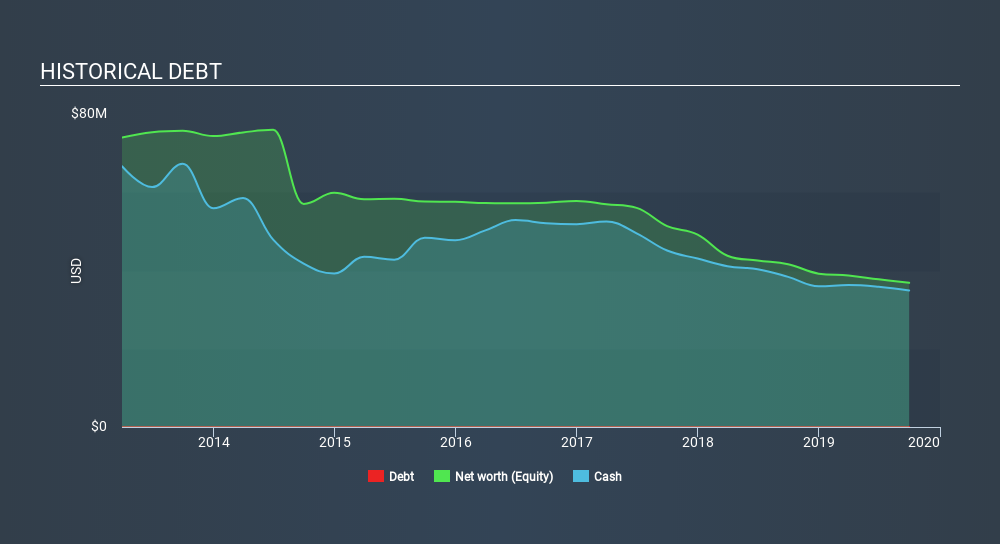- United States
- /
- Consumer Durables
- /
- NYSEAM:MSN
We're Hopeful That Emerson Radio (NYSEMKT:MSN) Will Use Its Cash Wisely

We can readily understand why investors are attracted to unprofitable companies. For example, although software-as-a-service business Salesforce.com lost money for years while it grew recurring revenue, if you held shares since 2005, you'd have done very well indeed. But while history lauds those rare successes, those that fail are often forgotten; who remembers Pets.com?
So should Emerson Radio (NYSEMKT:MSN) shareholders be worried about its cash burn? In this report, we will consider the company's annual negative free cash flow, henceforth referring to it as the 'cash burn'. We'll start by comparing its cash burn with its cash reserves in order to calculate its cash runway.
See our latest analysis for Emerson Radio
Does Emerson Radio Have A Long Cash Runway?
A cash runway is defined as the length of time it would take a company to run out of money if it kept spending at its current rate of cash burn. In September 2019, Emerson Radio had US$35m in cash, and was debt-free. Importantly, its cash burn was US$1.6m over the trailing twelve months. So it had a very long cash runway of many years from September 2019. While this is only one measure of its cash burn situation, it certainly gives us the impression that holders have nothing to worry about. Depicted below, you can see how its cash holdings have changed over time.

How Well Is Emerson Radio Growing?
It was fairly positive to see that Emerson Radio reduced its cash burn by 53% during the last year. Unfortunately, however, operating revenue declined by 45% during the period. In light of the data above, we're fairly sanguine about the business growth trajectory. In reality, this article only makes a short study of the company's growth data. This graph of historic earnings and revenue shows how Emerson Radio is building its business over time.
Can Emerson Radio Raise More Cash Easily?
There's no doubt Emerson Radio seems to be in a fairly good position, when it comes to managing its cash burn, but even if it's only hypothetical, it's always worth asking how easily it could raise more money to fund growth. Generally speaking, a listed business can raise new cash through issuing shares or taking on debt. Many companies end up issuing new shares to fund future growth. By comparing a company's annual cash burn to its total market capitalisation, we can estimate roughly how many shares it would have to issue in order to run the company for another year (at the same burn rate).
Emerson Radio's cash burn of US$1.6m is about 8.6% of its US$18m market capitalisation. That's a low proportion, so we figure the company would be able to raise more cash to fund growth, with a little dilution, or even to simply borrow some money.
Is Emerson Radio's Cash Burn A Worry?
As you can probably tell by now, we're not too worried about Emerson Radio's cash burn. For example, we think its cash runway suggests that the company is on a good path. Although we do find its falling revenue to be a bit of a negative, once we consider the other metrics mentioned in this article together, the overall picture is one we are comfortable with. Considering all the factors discussed in this article, we're not overly concerned about the company's cash burn, although we do think shareholders should keep an eye on how it develops. For us, it's always important to consider risks around cash burn rates. But investors should look at a whole range of factors when researching a new stock. For example, it could be interesting to see how much the Emerson Radio CEO receives in total remuneration.
If you would prefer to check out another company with better fundamentals, then do not miss this free list of interesting companies, that have HIGH return on equity and low debt or this list of stocks which are all forecast to grow.
If you spot an error that warrants correction, please contact the editor at editorial-team@simplywallst.com. This article by Simply Wall St is general in nature. It does not constitute a recommendation to buy or sell any stock, and does not take account of your objectives, or your financial situation. Simply Wall St has no position in the stocks mentioned.
We aim to bring you long-term focused research analysis driven by fundamental data. Note that our analysis may not factor in the latest price-sensitive company announcements or qualitative material. Thank you for reading.
About NYSEAM:MSN
Emerson Radio
Designs, sources, imports, markets, and sells various houseware and consumer electronic products under the Emerson brand in the United States and internationally.
Flawless balance sheet and overvalued.
Similar Companies
Market Insights
Community Narratives





